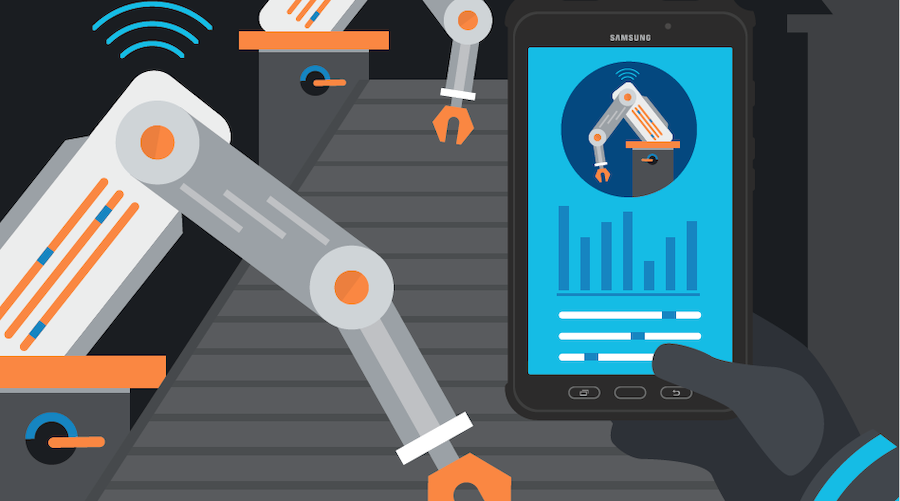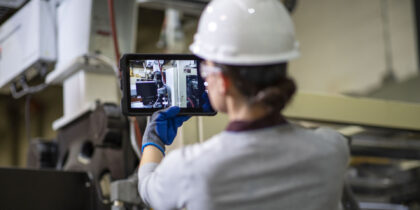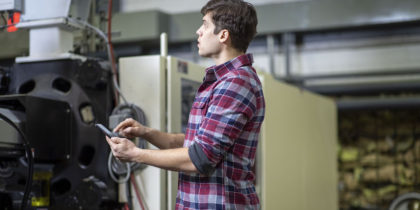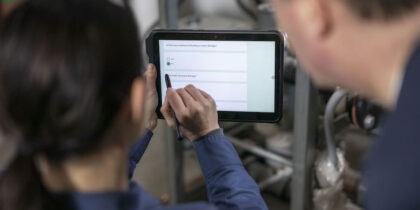Industry 4.0 was already driving wider adoption of mobile technology in manufacturing, but then COVID-19 arrived and raised the urgency level by several notches.
Like businesses across all sectors, smart factories are now adapting to new worker safety regulations and managing social distancing — all while continuing to raise the bar on efficiency and collaboration.
Industry 4.0 requires manufacturers to fundamentally rethink how they operate. As of this year, only 24 percent of manufacturers have implemented digital transformation programs beyond pilot stages. This group is leveraging a range of emerging technologies to increase productivity and drive revenue, including industrial internet of things (IIoT) data from embedded machines, access to cloud and hybrid computing, artificial intelligence (AI), machine learning and augmented reality (AR). The ability to harness these technologies begins with mobility.
Samsung has been working with a number of leading manufacturers to implement mobile innovation initiatives. These companies are using mobile devices as the platforms through which plant managers and workers can access cloud technologies with ease — and at scale — to create an agile, responsive and truly collaborative environment. Mobile devices — especially wearables — also help companies cope with pandemic-related considerations, such as social distancing and contact tracing.
Balancing mobility and productivity
Since mobile devices are the gateway to Industry 4.0, companies still working from legacy desktop computers or green screen terminals are reading the writing on the wall: Move to mobile or risk irrelevance. Embracing mobile devices comes with a particular challenge, however. How can organizations transition to an mobile-first computing strategy without disrupting productivity?
Modernize your factory with mobile
Get your free guide to the mobile technologies that will accelerate your smart factory journey. Download Now
When you look at the legacy terminals within many manufacturing plants, there’s a real opportunity to modernize with mobile-powered desktop technology like Samsung DeX, powered by the new Samsung Galaxy Note20 and Note20 Ultra 5G smartphones. Together, they deliver the untethered advantages of mobility while allowing team members to dock their phones for desktop work as needed. Now workers can access desktop functions using many integration options, from preloaded Microsoft Office, OneDrive and Outlook to the Microsoft Your Phone app.
Mobile helps you keep a pulse on manufacturing
Manufacturing back office and operations managers need complete visibility into each and every aspect of the manufacturing process, from supply chain logistics to enterprise asset management (EAM) to customer order fulfillment. Transparency leads to more streamlined operations and dramatically increased productivity as problems get noticed — and resolved — faster.
Going mobile-only with Samsung DeX and a Galaxy Note20 smartphone can help plant managers achieve this level of visibility, allowing them to shift seamlessly between mobile and desktop tasks. This is a vision achievable today if manufacturing operations leaders look carefully at their workflows and invest strategically in innovative mobile applications.
Imagine a plant manager completing an inspection of various production stations, taking notes on the go with their Galaxy Note20 smartphone and its highly responsive S Pen. If, for example, the manager discovers problems with a motor at a particular station, they can scan the barcode of the equipment and retrieve complete work histories related to that particular piece from the asset management application.
The manager can further investigate the matter by taking photographs of the malfunctioning machine and use overlaid images enabled by an AR application to get at the root source of the problem. With the speed of 5G, the Galaxy Note20 enables near real-time interactivity that the plant manager can leverage to access virtual assistance apps or livestream tutorials as needed. With the S Pen, the manager can take notes or circle an element in the photo and share it with a technician immediately. Whereas a repair work order might traditionally warrant a long trek back to the main office, such capabilities are now enabled onsite. And the Galaxy Note20’s intelligent, all-day battery stands up to the demands of plant managers’ long workday.
When needed, the plant manager can also use Samsung DeX to connect the Galaxy Note20 smartphone to any HDMI-compatible display, a keyboard and mouse, and in seconds be working on a mobile-powered desktop. They can order parts, update spreadsheets or write an email to a supplier with a familiar desktop experience that is powered by their smartphone.
In this mobile-only environment, plant supervisors no longer need to be tethered to their desktops or check into the office after every floor visit. In addition, advanced, secure 5G connectivity through the Galaxy Note20 delivers even more impressive productivity wins. With powerful technology like the Galaxy Note20, as well as our portfolio of rugged devices, we can create a connected mobile workspace for every employee.
More reasons to go mobile-only
There are many more arguments to be made for manufacturing companies to switch to mobile-powered computing with Samsung devices and DeX. Here are a few:
- Streamline device management: By reducing the number of devices that IT has to manage, you’ll reduce your technology costs significantly. Managing a fleet of Samsung smartphones with mobile device management (MDM)/enterprise mobility management (EMM) tools allows applications and policies to be quickly rolled out and simplifies troubleshooting, repair and replacement. You spend less, and your IT team will be able to focus on innovating instead of just troubleshooting.
- Maximize security: A security breach — whether of professional, employee or customer data — is one of the worst things that can happen to any company. This is especially true in manufacturing, where sensitive financial data regarding corporate accounts is passed back and forth, and patents may be in development. You can keep that information safe with Samsung’s smartphones, built from the chip up with Samsung Knox, our defense-grade security platform. Devices come equipped with an impressive arsenal of security features, including TrustZone-based Integrity Management Architecture and advanced biometric sensors. Knox on the Galaxy Note20 encrypts all data by default, using a government-certified encryption module.
- Make innovation laser-focused: Now that your devices are safe and easily managed, your company is equipped to more readily innovate. By investing in mobile apps to enable workflow innovation, you’ll pave the way for your company to be a technological leader.
Amid the challenges presented by COVID-19, manufacturing is undergoing a rapid shift toward digitization to improve efficiency, and the move to mobile is an essential step toward reaping the rewards of this digital revolution.
Learn more about how the Galaxy Note20 5G smartphone can power productivity, improve efficiency and enable workflow innovation. And get your free guide to accelerating your smart factory journey with mobile.







